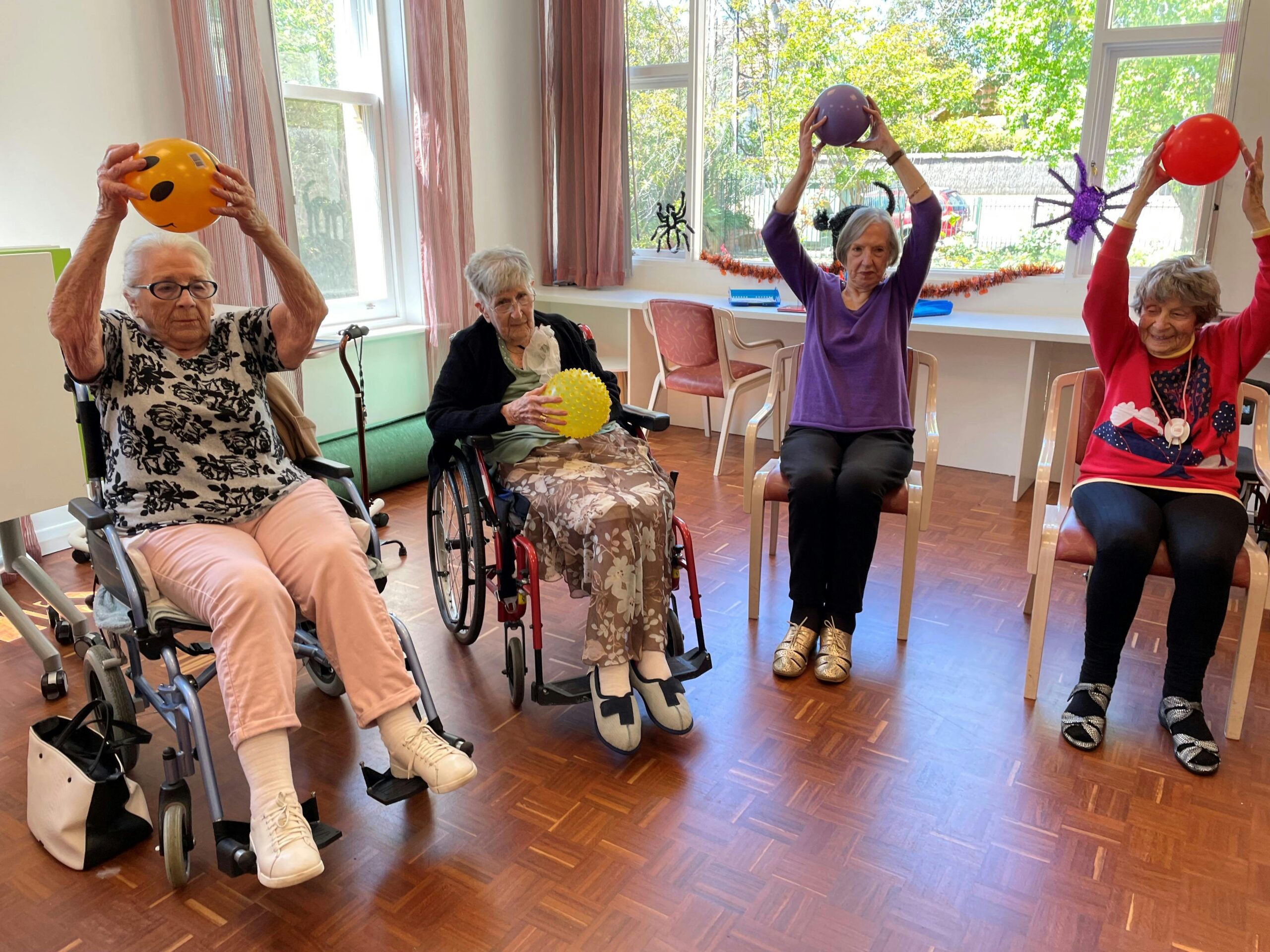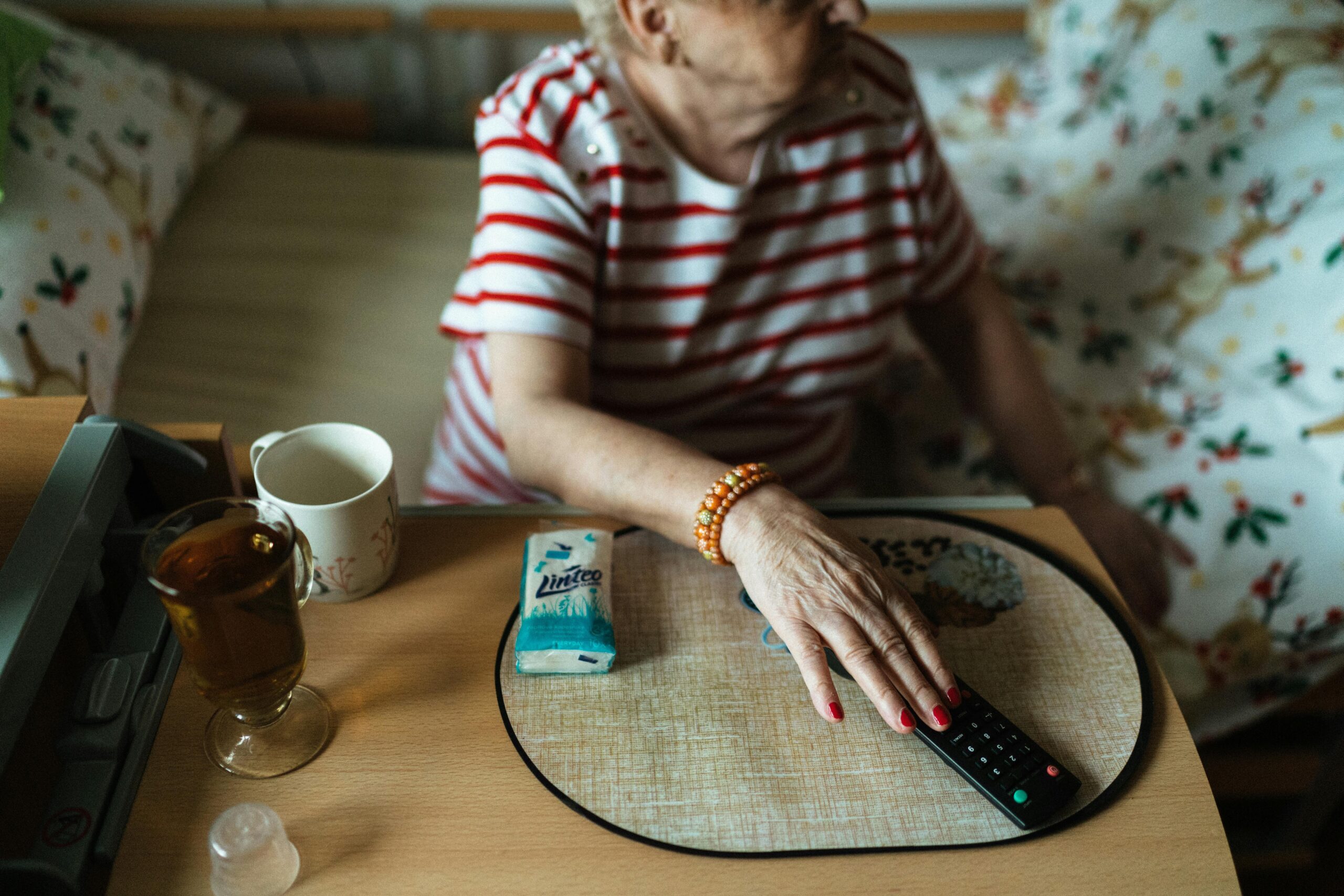Humberston House Hosts Festival
At Humberston House, the spirit of Glastonbury came to life, minus the...
Learn more
21 January 2025
Dementia care refers to a specialised approach to supporting individuals on their dementia journey. A progressive condition that impairs memory, thinking, and behaviour due to brain cell damage.
This type of care is distinct from general elderly care as it addresses the unique cognitive, emotional, and physical challenges posed by dementia. While elderly care focuses on general age-related needs, dementia care requires tailored strategies to support with symptoms such as memory loss, confusion, mood swings, and behavioural changes.
General elderly care primarily supports older adults with daily activities such as bathing, dressing, and mobility. It often includes managing chronic conditions like arthritis or diabetes. In contrast, dementia care goes beyond these basic needs by incorporating strategies to address the specific cognitive and emotional symptoms associated with dementia. For example:
Dementia care emphasises a holistic approach that considers the individual’s physical health, cognitive abilities, emotional state, and social connections:
Dementia care also evolves with the progression of the disease. In its early stages, individuals might benefit from minimal assistance and memory aids. However, as the condition advances, professional support in a residential or memory care setting may become necessary.

Quality dementia care is built upon several foundational principles that ensure individuals receive compassionate and effective support tailored to their unique needs. These principles include person-centred care, maintaining dignity, promoting independence, creating a safe environment, and fostering empathy.
Person-centred care is at the heart of quality dementia support. This approach tailors care plans to an individual’s preferences, history, abilities, and personality:
For example, a person who loved gardening might be encouraged to participate in planting flowers or watering plants as part of their daily routine.
Preserving dignity is essential in dementia care. This involves treating individuals with respect regardless of their cognitive abilities:
Maintaining dignity fosters trust between caregivers and residents while promoting self-esteem.
Encouraging independence helps individuals retain a sense of control over their lives:
Even small acts of independence contribute significantly to an individual’s sense of autonomy.
Safety is paramount in dementia care due to risks such as wandering or falls:
A well-designed environment not only ensures safety but also minimises anxiety for residents.
Empathy is a cornerstone of quality dementia care. It involves understanding the world from the perspective of someone living with dementia:
Empathy fosters trust and emotional connection between caregivers and residents while improving overall care outcomes.
Dementia care is far more than meeting basic needs—it’s about addressing the complex interplay of physical health, cognitive function, emotional well-being, and social engagement in a compassionate manner. By adhering to principles like person-centred care, maintaining dignity, promoting independence, creating safe spaces, and practising empathy, caregivers can significantly enhance the quality of life for individuals living with dementia. At Tanglewood Care Homes, we pride ourselves on delivering this level of dedicated support through our highly trained staff and person-centred approach.
Dementia care services are designed to address the complex and evolving needs of individuals living with dementia, as well as to support their families. These services cater to different stages of dementia, from early symptoms to advanced stages, and provide tailored care to ensure safety, dignity, and quality of life. Below, we explore the various types of dementia care services available, including residential care homes, memory care units, in-home dementia care, day centres, and respite care, highlighting how each service caters to specific needs.
Residential care homes provide accommodation and personal care for individuals who need assistance with daily activities such as bathing, dressing, medication management, and mobility. These homes are suitable for individuals in the moderate to advanced stages of dementia who may no longer be able to live safely at home.
Memory care units are specialised facilities within residential or nursing homes that focus exclusively on supporting individuals with dementia. These units cater to those in moderate to advanced stages of the condition.
Memory care units provide a higher level of support than general residential homes, making them suitable for individuals with significant behavioural or cognitive challenges.
In-home dementia care allows individuals to remain in the comfort of their own homes while receiving professional support tailored to their needs. This option is particularly beneficial during the early to moderate stages of dementia when familiarity with surroundings can ease anxiety.
This option is ideal for families who wish to delay transitioning their loved one into a residential setting while ensuring they receive adequate support.
Day centres provide daytime support for individuals with dementia while offering respite for family caregivers. These centres are particularly beneficial for those in the early to moderate stages of dementia who can benefit from social interaction and structured activities.
Day centres offer a flexible solution for families who need temporary support during working hours or other commitments.
Respite care provides temporary relief for family caregivers by ensuring that their loved one receives professional support either at home or in a specialised facility. This service is valuable across all stages of dementia but is particularly helpful during periods of caregiver burnout or when additional support is needed.
Respite care ensures that both caregivers and individuals with dementia receive the support they need without compromising quality of life.
Each type of service caters to specific stages of dementia:
At Tanglewood Care Homes, we understand that every individual’s journey with dementia is unique, and ensure that families can find the right solution at every stage of the condition. Our compassionate approach focuses on maintaining dignity, promoting well-being, and supporting families through this challenging journey.

Deciding when to seek professional dementia care is a deeply personal and often emotional decision for families. While many caregivers strive to provide support at home, dementia is a progressive condition that increasingly demands specialised care as it advances. Recognising the signs that professional care is necessary can ensure the safety, well-being, and quality of life for both the individual living with dementia and their family members.
Safety becomes a significant issue as dementia progresses. Individuals may exhibit behaviours or experience cognitive challenges that put them at risk in their current living environment. Common safety concerns include:
If these risks become unmanageable at home, professional care settings like residential homes or memory care units provide secure environments with round-the-clock supervision to prevent accidents and ensure safety.
Caring for someone with dementia is both physically and emotionally demanding. Over time, caregivers may experience burnout—a state of exhaustion caused by prolonged stress. Signs of caregiver burnout include:
Burnout not only affects the caregiver’s well-being but also compromises the quality of care they can provide. If caregiving feels overwhelming or leads to resentment, seeking professional support—such as respite care or transitioning to a residential facility—can provide relief and ensure the individual receives consistent care.
Dementia symptoms worsen over time, making it increasingly difficult for families to manage care at home. Indicators that professional care may be needed include:
As dementia progresses into its later stages, individuals may develop challenging behaviours that are difficult for families to manage at home. These include:
Professional dementia care facilities employ trained staff who understand how to de-escalate these behaviours using therapeutic techniques such as validation therapy and redirection.
Every caregiving situation is unique, but there are limits to what families can realistically manage at home. Factors that might indicate it’s time for professional care include:
Recognising these limitations is not a failure but an acknowledgment of the need for additional support.
Individuals with dementia often withdraw from social interactions due to cognitive challenges or embarrassment about their condition. This isolation can negatively impact their emotional well-being. Professional care facilities offer structured activities and opportunities for social engagement tailored to individuals’ abilities. Group activities such as reminiscence therapy, music sessions, and gentle exercise help maintain cognitive function while fostering a sense of community.
Deciding when to transition a loved one into professional dementia care is never easy. It often involves feelings of guilt or uncertainty about whether it’s the right time. Families should consider consulting healthcare professionals who specialise in dementia care for guidance. Assessments by doctors or social workers can help determine whether current arrangements are sufficient or if additional support is needed.
At Tanglewood Care Homes, we understand how challenging this decision can be. Our compassionate team is here to provide guidance every step of the way. Whether through respite care options for family caregivers needing a break or full-time residential support tailored to advanced dementia needs, we prioritise safety, dignity, and quality of life for every resident.
By recognising these signs early and seeking professional support when needed, families can ensure their loved ones receive the specialised care they deserve while maintaining their own well-being.
Person-centred care is a transformative approach to dementia care that places the individual, rather than the condition, at the heart of all care practices. By tailoring support to each person’s unique preferences, history, and abilities, this method ensures that individuals living with dementia are treated with dignity and respect while maintaining their sense of identity.
Person-centred care focuses on recognising and valuing the individuality of each person. Developed by Professor Thomas Kitwood in the 1980s, this approach views people living with dementia as unique individuals with their own life stories, personalities, and preferences. The goal is to provide care that respects their values, promotes independence, and fosters emotional well-being.
This approach shifts the focus from task-based care to holistic support that prioritises emotional and psychological needs alongside physical health.
Dementia can cause individuals to feel disconnected from their sense of self due to memory loss and cognitive decline. Person-centred care helps bridge this gap by recognising the person behind the diagnosis. By tailoring care to their specific needs and preferences, it fosters a sense of identity and belonging.
For example:
These personalised activities not only provide enjoyment but also stimulate cognitive function and reduce feelings of frustration or anxiety.
Person-centred care significantly enhances quality of life by creating an environment where individuals feel valued and understood. Studies show that this approach reduces agitation, depression, and other behavioural symptoms associated with dementia. By focusing on what matters most to the individual, caregivers can create moments of joy and fulfilment even in advanced stages of the condition.
Understanding a person’s history and preferences helps create a comforting environment that reduces confusion and anxiety. For instance:
This emotional stability fosters trust between caregivers and residents, promoting a more positive caregiving experience.
Empowering individuals to make choices about their daily lives—even small ones like selecting meals or clothing—boosts confidence and self-worth. This autonomy helps maintain a sense of control over their environment, which is particularly important as dementia progresses.
By understanding triggers for distress (e.g., loud noises or unfamiliar settings), caregivers can anticipate challenges and implement strategies to prevent them. Tailored activities also help redirect attention away from triggers, reducing agitation or aggression.
Person-centred care encourages collaboration between caregivers, families, and individuals with dementia. Family members are often invited to share insights into their loved one’s preferences or participate in activities. This involvement strengthens bonds while ensuring that care remains aligned with the individual’s values.
Caregivers create personalised biographies detailing an individual’s life history, achievements, and interests. These stories inform daily interactions and activities, making them more meaningful. For example, a resident who once enjoyed baking might be encouraged to help prepare simple recipes.
At Tanglewood Care Homes, we encourage residents to personalise their living spaces with familiar items such as photographs or mementos. This creates a homely atmosphere that promotes comfort and reduces anxiety.
Activities are designed around individual interests—for instance:
These activities not only engage residents but also help maintain cognitive abilities.

Research demonstrates significant positive changes in dementia patients who receive specialised care interventions. The most notable improvements occur across three key areas of health management: agitation reduction, cognitive function, and depression levels.
Patients show marked decreases in agitation and neuropsychiatric symptoms through structured care programmes. According to the British Journal of Psychiatry’s 2022 study, 65% of participants experienced reduced episodes of agitation within eight weeks of starting personalised care routines. These improvements led to better sleep patterns and decreased the need for medication interventions.
Cognitive function gains present another compelling benefit. Regular engagement in memory-focused activities delivers measurable results, with several key improvements noted:
Depression management shows particularly promising outcomes. The Royal College of Psychiatrists reports that targeted social interaction programmes reduce depression symptoms in 72% of dementia patients. This improvement correlates with increased participation in group activities and enhanced family connections.
Physical health markers also display positive trends during comprehensive care. Blood pressure readings stabilise in 58% of patients, while sleep quality improves for 63% of individuals receiving structured support. These physiological improvements contribute to overall wellbeing and help slow symptom progression.
Professional care settings create environments where these benefits can be maximised through consistent monitoring and adjustment of care strategies. Staff members track progress using standardised assessment tools, allowing for precise measurement of improvements and quick adaptation of care plans as needed.
Regular social interactions, combined with personalised activity schedules, produce the most substantial gains. Patients participating in daily structured activities show 45% greater improvement across all measured health indicators compared to those receiving standard care alone. These activities include music therapy, art sessions, and gentle exercise programmes, each contributing to the overall positive health outcomes.
Engaging in meaningful activities is essential for individuals with dementia, as it helps maintain cognitive abilities, emotional well-being, and a sense of identity. These activities are tailored to stimulate the mind, body, and senses while fostering social interaction and enjoyment. Below, we explore several beneficial activities for people with dementia and how they contribute to their overall quality of life.
Reminiscence therapy encourages individuals to recall and discuss past experiences, often using prompts like photographs, music, or familiar objects. This activity taps into long-term memory, which is typically better preserved in people with dementia.
Music has a profound impact on individuals with dementia, even in advanced stages. Familiar songs can evoke emotions, trigger memories, and encourage participation through singing or movement.
Gardening offers both physical and mental stimulation and provides an opportunity to connect with nature. Activities like planting seeds, watering plants, or tending to flowers are particularly beneficial.
Creative activities such as painting, drawing, or crafting provide an outlet for self-expression and emotional release. These activities can be adapted to suit varying skill levels.
Sensory activities engage the senses—touch, smell, sight, sound, and taste—to evoke memories or provide comfort. Examples include handling textured objects, smelling familiar scents like lavender or baking spices, or listening to nature sounds.
Activities that challenge the brain—such as puzzles, word games, or memory exercises—help maintain cognitive function in the early to moderate stages of dementia.
Physical movement is vital for maintaining overall health and well-being. Gentle exercises like walking, chair yoga, or dancing are particularly effective for people with dementia.
By incorporating reminiscence therapy, music therapy, gardening, art classes, sensory stimulation, cognitive exercises, and physical activities into daily routines, you create opportunities for joy, connection, and personal growth. These activities not only preserve cognitive abilities but also nurture emotional well-being and foster a sense of purpose.
Creating a safe environment is crucial for individuals living with dementia as it reduces risks associated with wandering or confusion while promoting comfort and independence. A well-designed space can minimise anxiety by providing clear cues for navigation and ensuring physical safety.
Wandering is a common behaviour in people with dementia that poses safety risks such as getting lost or encountering hazards.
These measures allow individuals to move freely within safe boundaries while reducing anxiety for caregivers.
Clear signage helps individuals navigate their surroundings independently by reducing confusion.
Use large fonts with high contrast colours for better visibility.
This approach supports wayfinding abilities that may decline as dementia progresses.
Colour plays a significant role in helping individuals distinguish between spaces or objects.
Colour-coded designs make spaces more intuitive and easier to navigate.
A calming atmosphere reduces agitation often experienced by people with dementia.
These elements create a relaxing environment that promotes emotional well-being.
Physical safety is paramount in preventing falls or injuries within living spaces.
These adaptations ensure mobility support while reducing risks associated with accidents.
Personalising spaces helps residents feel more at home by fostering familiarity and comfort.
Personalisation reinforces identity while making environments feel secure and welcoming.
At Tanglewood Care Homes, we prioritise creating safe environments that cater specifically to the needs of individuals living with dementia. By incorporating secure spaces, clear signage, colour-coded designs, calming sensory elements, safety features, and personalisation into our care settings, we ensure residents feel supported while maintaining their dignity and independence. A thoughtfully designed environment not only prevents risks but also fosters confidence and peace of mind for both residents and their families.
Family involvement in dementia care is crucial for maintaining a sense of connection, ensuring personalised support, and enhancing the overall quality of life for loved ones. While professional caregivers provide expert assistance, family members play an irreplaceable role in preserving the individual’s identity, history, and emotional well-being. Below, we outline practical strategies for families to remain actively involved in dementia care and emphasise the importance of communication with care staff to foster a collaborative approach.
Even when professional caregivers are involved, family members can contribute significantly by participating in their loved one’s daily routines and activities. This involvement helps maintain a sense of familiarity and continuity for the person with dementia.
By staying involved in these ways, families can help create a care environment that feels personal and supportive.
Clear and consistent communication between families and professional caregivers is essential for ensuring that care remains person-centred and aligned with the individual’s needs.
Effective communication fosters trust between families and caregivers while ensuring that everyone remains focused on providing the best possible support.
Frequent visits reassure individuals with dementia that they are not alone and help maintain emotional connections.
Regular visits not only benefit the individual but also allow families to observe their care environment and address any concerns directly with staff.
Family members often serve as advocates for individuals with dementia, ensuring their needs are met and their voices are heard.
Developing positive relationships with professional caregivers enhances collaboration and creates a supportive environment for everyone involved.
Strong family-staff relationships contribute to a cohesive caregiving experience that benefits both the individual with dementia and their family.
Connecting with other families who are navigating similar challenges can provide valuable emotional support and practical advice.
Support groups empower families by equipping them with knowledge and emotional resilience. For example, The Alzheimer’s Society runs dementia cafés, which provide informal, friendly environments for people with dementia and their carers to meet, chat, and share experiences. These sessions often include professional carers who can offer advice.
At Tanglewood Care Homes, we prioritise family involvement as an integral part of our approach to dementia care. We believe that collaboration between families and our dedicated team enhances the well-being of residents while providing families with peace of mind knowing their loved ones are supported in every way possible.

Caring for someone with dementia is often described as one of the most demanding caregiving roles due to the progressive and unpredictable nature of the condition. While it can be rewarding to support a loved one, caregivers frequently face significant emotional, physical, and mental challenges. Below, we outline these challenges in detail and provide strategies for managing them, along with available support resources.
Caring for someone with dementia can take an emotional toll, leading to feelings of sadness, frustration, guilt, or grief. Many caregivers experience “anticipatory grief,” mourning the gradual loss of the person they once knew as the disease progresses. Additionally, behavioural changes in the individual—such as aggression, paranoia, or confusion—can be distressing to witness and manage.
The physical demands of caregiving can be overwhelming, especially as dementia progresses and individuals require assistance with daily activities such as bathing, dressing, and mobility. Sleep disturbances are also common among caregivers due to night-time wandering or restlessness in the person with dementia.
Behavioural and psychological symptoms of dementia (BPSD), such as aggression, agitation, repetitive questioning, or hallucinations, are among the most challenging aspects of caregiving. These behaviours often stem from fear, confusion, or unmet needs.
Many caregivers find themselves socially isolated due to the demands of their role. They may feel unable to attend social events or maintain relationships because their time is consumed by caregiving responsibilities.
Caregiving often comes with significant financial costs, including lost income due to reduced work hours or leaving employment altogether, as well as expenses related to medical care or home modifications.
Families bear approximately 63% of the lifetime cost of caring for someone with dementia through out-of-pocket expenses or unpaid care.
Numerous organisations provide invaluable resources for dementia caregivers:
Caregiving for someone with dementia is a demanding yet deeply meaningful role that comes with significant challenges—emotional stress, physical exhaustion, managing behavioural changes, social isolation, financial strain, and feelings of guilt. However, by adopting effective coping strategies such as seeking support from others, practising self-care, accessing professional resources, and reframing expectations, caregivers can better navigate these challenges while maintaining their own well-being.

Behavioural changes are a common and challenging aspect of dementia care, often resulting from the individual’s difficulty in expressing needs, processing their environment, or coping with cognitive decline. These behaviours, which may include agitation, aggression, wandering, or repetitive actions, can be distressing for both the person with dementia and their caregivers. Effective dementia care focuses on understanding the triggers behind these behaviours and implementing non-pharmacological strategies to manage them compassionately.
Behavioural changes in dementia are often a form of communication. The individual may be trying to express unmet needs or respond to discomfort. Common triggers include:
Caregivers can identify triggers by observing patterns in behaviour and keeping a diary to track when and where these behaviours occur. Understanding the root cause allows for tailored interventions that address the underlying issue rather than just the symptom.
Validation therapy involves acknowledging and validating the emotions behind a person’s behaviour without attempting to correct or challenge their perception of reality. This approach helps reduce agitation by fostering trust and emotional connection.
Redirection involves gently steering the individual’s attention away from distressing stimuli or behaviours toward something positive and engaging.
Effectiveness: Redirection works best when paired with knowledge of the individual’s interests and preferences.
Creating a calm environment is crucial for managing agitation and confusion. This involves minimising stressors and providing sensory experiences that promote relaxation.
These strategies help de-escalate situations quickly while promoting a sense of safety and security.
Engaging individuals in meaningful activities tailored to their abilities and interests can prevent behavioural issues by reducing boredom and providing a sense of purpose.
Activities not only distract from triggers but also enhance overall well-being.
Consistency is key in managing behavioural changes effectively. Caregivers should establish predictable routines for daily activities like meals, bathing, and bedtime. Familiarity helps reduce anxiety caused by uncertainty. Additionally:
Nutrition plays a vital role in the care of individuals living with dementia, as it directly impacts their physical health, cognitive function, and overall quality of life. Properly balanced meals tailored to individual needs can help manage symptoms such as agitation, fatigue, and weight loss while reducing the risk of malnutrition and dehydration.
As dementia progresses, individuals often face challenges in maintaining proper nutrition due to factors such as memory loss, changes in appetite, difficulty recognising hunger or thirst, and physical limitations. Poor nutrition can exacerbate symptoms of dementia, leading to increased behavioural issues, cognitive decline, and physical weakness.
Each person with dementia has unique dietary requirements based on their stage of the condition, medical history, and personal preferences. Tailoring meals ensures that nutritional needs are met while also making mealtimes enjoyable.
The mealtime environment plays a significant role in encouraging individuals with dementia to eat well. A calm and supportive setting can reduce anxiety and make eating more enjoyable.
These adjustments make mealtimes less stressful for both individuals with dementia and their caregivers.
Certain dietary patterns have been shown to benefit cognitive function:
These diets not only support brain health but also reduce the risk of cardiovascular diseases that are linked to dementia progression.
Dementia often brings specific challenges related to eating and drinking:
Caregivers should monitor these challenges closely and seek advice from dietitians or healthcare professionals when needed.
Caring for someone with dementia can be emotionally and physically demanding, and the associated costs can place a significant financial strain on families. Fortunately, there are several financial support options available in the UK to help cover the costs of dementia care. These include NHS Continuing Healthcare (CHC), local authority support, Attendance Allowance (AA), and Carer’s Allowance. Below, we outline these options in detail, including eligibility criteria and how they can assist families.
NHS Continuing Healthcare (CHC) is a package of care that is fully funded by the NHS for individuals with complex, ongoing health needs. This funding can cover care provided at home, in a care home, or in other settings.
Local authorities provide financial assistance for care based on an individual’s needs and financial situation. This support is means-tested and may include services such as home adaptations, day centres, respite care, or homecare visits.
Attendance Allowance is a non-means-tested benefit designed to help individuals over State Pension age who need assistance with personal care or supervision due to a disability or health condition like dementia.
How It Helps: The allowance can be used flexibly—for example, to pay for home adaptations or additional care services.
How to Apply: Applications are made through a form available from the Department for Work and Pensions (DWP). Assistance with completing the form is available from organisations like Age UK or Citizens Advice.
Attendance Allowance does not affect other benefits and can often increase entitlement to means-tested benefits such as Pension Credit.
Carer’s Allowance provides financial support to individuals who spend at least 35 hours per week caring for someone with dementia.
Impact on Other Benefits: Receiving Carer’s Allowance may affect other benefits received by either the carer or the person being cared for. For example, it may reduce severe disability premiums attached to certain benefits.
How to Apply: Applications can be made online via GOV.UK or by post using forms provided by the DWP.
Carers may also qualify for Carer’s Credit, which helps fill gaps in National Insurance contributions to protect their State Pension entitlement.
Several organisations offer guidance and support when applying for financial assistance:
Navigating the financial aspects of dementia care can be complex, but there are several avenues of support available in the UK.

Tanglewood Care Homes is dedicated to providing compassionate, person-centred dementia care that prioritises the well-being and dignity of every resident. Our expertly trained staff understand that dementia affects each individual differently, which is why we tailor our care plans to meet the unique needs of every resident. Through daily interactions and personalised activities such as reminiscence therapy, gardening, and music sessions, we ensure that residents feel valued, engaged, and supported. Our homes are designed with safety and comfort in mind, featuring dementia-friendly layouts with clear signage, secure outdoor spaces, and calming environments to reduce anxiety and promote independence.
At Tanglewood, we believe in fostering strong partnerships with families to create a holistic care experience. We encourage family involvement in care planning and provide regular updates to ensure peace of mind. With 18 purpose-built care homes across the UK offering industry-leading facilities such as on-site cafés, cinemas, and hair salons, Tanglewood is more than just a care provider—it’s a community where residents can thrive. Take the next step for your loved one’s care by contacting us today or arranging a visit to one of our welcoming homes to see how we can support you and your family.
To learn more about Tanglewood Care Homes or to arrange a visit to one of our care homes, please call us on 01205 358888 or email us at info@twhealthcare.co.uk.